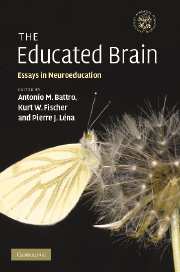Book contents
- Frontmatter
- Contents
- List of figures
- List of tables
- List of contributors
- Preface
- Foreword: Towards a new pedagogical and didactic approach
- Part I The mind, brain, and education triad
- 1 Introduction: Mind, brain, and education in theory and practice
- 2 Historical considerations on brain and self
- 3 Building bridges in neuroeducation
- 4 Mind, brain, and consciousness
- 5 Understanding mind, brain, and education as a complex, dynamic developing system: Measurement, modeling, and research
- Part II Brain development, cognition, and education
- Part III Brain, language, and mathematics
- Index
- References
4 - Mind, brain, and consciousness
from Part I - The mind, brain, and education triad
Published online by Cambridge University Press: 22 September 2009
- Frontmatter
- Contents
- List of figures
- List of tables
- List of contributors
- Preface
- Foreword: Towards a new pedagogical and didactic approach
- Part I The mind, brain, and education triad
- 1 Introduction: Mind, brain, and education in theory and practice
- 2 Historical considerations on brain and self
- 3 Building bridges in neuroeducation
- 4 Mind, brain, and consciousness
- 5 Understanding mind, brain, and education as a complex, dynamic developing system: Measurement, modeling, and research
- Part II Brain development, cognition, and education
- Part III Brain, language, and mathematics
- Index
- References
Summary
Overview
One concern of philosophers is linking philosophical thought with scientific research and theory. Philosophy and psychology have common historical roots, and several important concepts such as consciousness have been approached from various points of views from both disciplines. Biology, especially neuroscience, is making its own path of discovery in the same realm from a different perspective. Mittelstrass argues that many reductionistic explanations in psychology have failed, such as behaviorism. Will cognitive neuroscience show similar limits? In any case contemporary philosophers mostly support a dualistic approach to the mind-brain question, while scientists typically prefer a monistic view. There are, of course, different shadings and textures in these options, but the wide use of brain imaging often leads to an assumption that psychic states are simply neurophysiological states described by local brain metabolism. One extreme position is what Vidal in his chapter calls “brainhood,” the assumption that a person is entirely defined by his or her brain. A fruitful alternative may be a pragmatic dualism that values science's theoretical concepts while maintaining a dualist view.
The Editors
The relations between mind and body, brain and consciousness today lie at the centre not only of scientific, but also of philosophical interest. They were there once already, namely at the beginnings of modern thought, where we may find them within the so-called “remainder problems” of Cartesian dualism, in the guise of the problem of the relation between mind and body – res cogitans and res extensa, in Cartesian terminology.
- Type
- Chapter
- Information
- The Educated BrainEssays in Neuroeducation, pp. 59 - 70Publisher: Cambridge University PressPrint publication year: 2008



